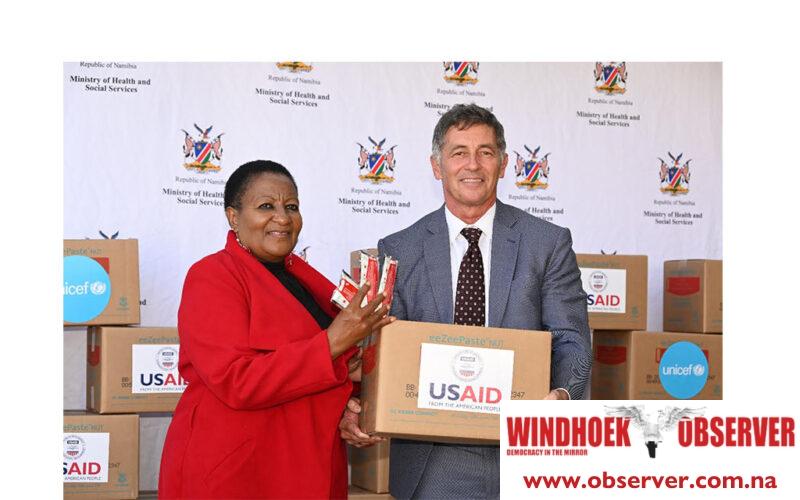Niël Terblanché
The United States government donated 14 tonnes of ready-to-use therapeutic food to Namibia’s Ministry of Health and Social Services.
This donation, valued at N$966,000, aims to address the effects of the drought and the resultant food insecurity situation in Namibia.
According to the latest Integrated Food Security Phase Classification Report, one in five Namibians regularly goes to bed hungry.
The donation is part of a broader agreement between the United States Agency for International Development (USAID) and Chevron.
This partnership has committed N$5.7 million to support water access projects and N$1 million for emergency drought relief for the food-insecure population in Namibia.
Namibia, like much of Southern Africa, is in the grip of a prolonged drought.
The Ministry of Agriculture, Water, and Land Reform reports that central dams are running low, and the National Strategic Food Reserves are at roughly 16% of their total capacity.
“These are not just numbers; they are alarming statistics that demand our immediate attention,” U.S. Ambassador to Namibia Randy Berry said.
He pointed out that climate change effects, such as frequent droughts and unpredictable rainfall patterns, are exacerbating these challenges.
“We must act now, both in the long term with climate change mitigation and adaptation measures and immediately to provide relief to those in urgent need, particularly malnourished vulnerable populations,” he said.
The emergency drought relief sachets will be distributed by the United Nations Children’s Fund (UNICEF).
The ready-to-use therapeutic food will be allocated to hospital paediatric wards, health centres, and clinics, with a focus on pregnant and postpartum women and children under fifteen years diagnosed with severe acute malnutrition.
Utjiua Muinjangue, Deputy Minister of Health and Social Services, expressed gratitude for the longstanding relationship between Namibia and the United States.
Muinjangue pointed to the severe impact of the ongoing drought and the COVID-19 pandemic on poverty and food security in Namibia.
“It is envisaged that this donation will have a positive impact on the prevention and treatment of malnutrition. It is a privilege to thank the people of the United States for their generous support to the Ministry of Health and Social Services, and specifically to the mothers and children at the community level who will benefit from this therapeutic food,” she said.
She added that, despite improvements in health and nutrition, significant disparities in access to services persist, necessitating continued support from donor countries like the United States.
Namibia has increased budgetary allocations to prioritise HIV prevention and treatment, as well as maternal, infant, young child, and adolescent nutrition and health.
These allocations are not yet proportionate to the challenges at hand.
“I would like to commend the people of the United States for their contributions to food and nutrition security interventions and malnutrition treatment and prevention programmes in Namibia,” she said.
She also acknowledged the support provided by the U.S. through UNICEF, including capacity development for health and community health workers, essential equipment and supplies, and the development of policies and guidelines for nutrition management in the context of HIV.
“This partnership has contributed tremendously to the transformation of health, social, and economic indicators for the better,” she said.




